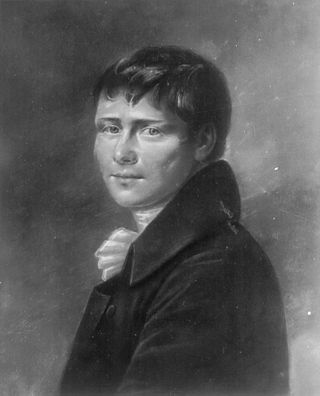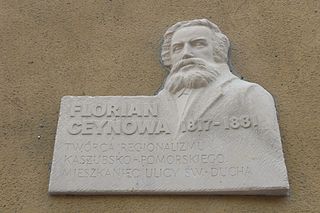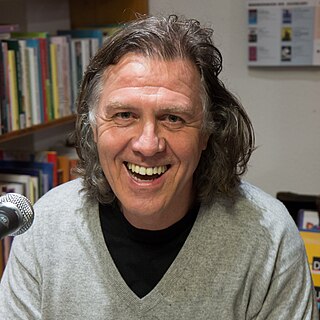See also
- The Secret Language of Birds , an Ian Anderson album
Language of the birds is in mythology, medieval literature and occultism, a mystical, perfect or divine language, or a mythical or magical language used by birds to communicate with the initiated.
Language of the birds is an informal reference to the communication systems of birds.
Language of the Birds may also refer to:

Bernd Heinrich Wilhelm von Kleist was a German poet, dramatist, novelist, short story writer and journalist. His best known works are the theatre plays The Prince of Homburg, Das Käthchen von Heilbronn, The Broken Jug, Amphitryon and Penthesilea, and the novellas Michael Kohlhaas and The Marquise of O. Kleist died by suicide together with a close female friend who was terminally ill.

August Schleicher was a German linguist. Schleicher studied the Proto-Indo-European language and devised theories concerning historical linguistics. His great work was A Compendium of the Comparative Grammar of the Indo-European Languages in which he attempted to reconstruct the Proto-Indo-European language. To show how Indo-European might have looked, he created a short tale, Schleicher's fable, to exemplify the reconstructed vocabulary and aspects of Indo-European society inferred from it.

Florian Stanisław Ceynowa was a doctor, political activist, writer, and linguist. He undertook efforts to identify Kashubian language, culture and traditions. He and Alexander Hilferding were not the only ones to study the language and legends of the Kashubians, but they had the greatest influence and prompted others to take up investigations. The individual nature of the Kashubian character and language was first described by Hilferding, to whom we are indebted for the first data about the range of Kashubian dialects. In 1856, he and Ceynowa traveled to the Kashubia. He awakened Kashubian self-identity, thereby opposing Germanisation and Prussian authority, and Polish nobility and clergy. He believed in a separate Kashubian identity and strove for a Russian-led pan-Slavic federation. He strove to create a program aimed at the introduction of a Kashubian standard in grammar, pronunciation and spelling, based on the spirit of the 1848 Revolution. He compiled treatises on Kashubian grammar and published Kashubian texts along with their translations into other Slavic languages. An important person for Kashubian literature, he was also a translator of Russian texts into Kashubian language.
The Thracian language is an extinct and poorly attested language, spoken in ancient times in Southeast Europe by the Thracians. The linguistic affinities of the Thracian language are poorly understood, but it is generally agreed that it was an Indo-European language.

The Duden is a dictionary of the Standard High German language, first published by Konrad Duden in 1880, and later by Bibliographisches Institut GmbH, which was merged into Cornelsen Verlag in 2022.

Anton Reichenow was a German ornithologist and herpetologist.

Fritz Mauthner was an Austrian philosopher and author of novels, satires, reviews and journalistic works. He was an exponent of philosophical scepticism derived from a critique of human knowledge and of philosophy of language.
German studies, also often known as German philology, is the field of humanities that researches, documents and disseminates German language and literature in both its historic and present forms. Academic departments of German studies often include classes on German culture, German history, and German politics in addition to the language and literature component. Common German names for the field are Germanistik, Deutsche Philologie, and Deutsche Sprachwissenschaft und Literaturwissenschaft. In English, the terms Germanistics or Germanics are sometimes used, but the subject is more often referred to as German studies, German language and literature, or German philology.
In linguistics, a sprachraum is a geographical region where a common first language, with dialect varieties, or group of languages is spoken.

August Johann Gottfried Bielenstein was a Baltic German linguist, folklorist, ethnographer, and theologian.
Hadiyya is the language of the Hadiya people of Ethiopia. Over 1.2 million speakers of Hadiyya, making it one of the ten major languages in Ethiopia. It is a Highland East Cushitic language of the Afroasiatic family. Most speakers live in the Hadiya Zone of the Southern Nations, Nationalities, and People's Region (SNNPR). The language has four recognized dialects—Leemo, Badawacho, Shashogo, and Sooro. These are mutually intelligible, with slight regional variations.

Isaac Jacob Schmidt was an Orientalist specialising in Mongolian and Tibetan. Schmidt was a Moravian missionary to the Kalmyks and devoted much of his labour to Bible translation.
The Wörterbuch der ägyptischen Sprache, abbreviated Wb in bibliographic references, is a large German-language dictionary of the Egyptian language published between 1926 and 1961 by Adolf Erman and Hermann Grapow. It is a comprehensive work encompassing 3000 years of linguistic history, including Old, Middle, and Late Egyptian as well as hieroglyphic inscriptions of the Classical Greco-Roman period. The dictionary contains approximately 16,000 headwords in five main volumes, two secondary volumes, and five volumes of primary source references. It is therefore the largest and most complete printed dictionary of Ancient Egyptian in existence.

Ludwig Noiré was a German philosopher, known for his studies involving the philosophy of language. He was born in Alzey.

Vogelfrei in German usage denotes the status of a person on whom a legal penalty of outlawry has been imposed. However, the original meaning of the term referred to independence, being "free as a bird".

Marica Bodrožić is a German writer of Croatian descent. She was born in Svib in Cista Provo, Croatia in the former Yugoslavia. She moved to Germany as a child and currently lives in Berlin.

Norbert Scheuer is a German author.

Erasmus Schöfer was a German writer. He was a member of the German Communist Party and took part in resistance against the Vietnam War and rearmament, among others, and became the chronicler of resistance in Germany in his main work, a tetralogy of novels, Die Kinder des Sisyfos. It is based on recent history, from the protests of 1968 in West Germany up to the political and social developments of the 1980s until German reunification. He also wrote poetry, stories, plays and audio plays.

The Language of the Birds, JS 62, is a theatre score for orchestra written in 1911 by the Finnish composer Jean Sibelius. The music comprises just a single number: the "Wedding March" to accompany a festive scene in Act III. However, no production of Paul's play appears to have utilized Sibelius's music, and as such, The Language of the Birds had to wait until 21 September 1983 for its world premiere, when the Finnish conductor Esa-Pekka Salonen and the Finnish Radio Symphony Orchestra played it over yle radio.